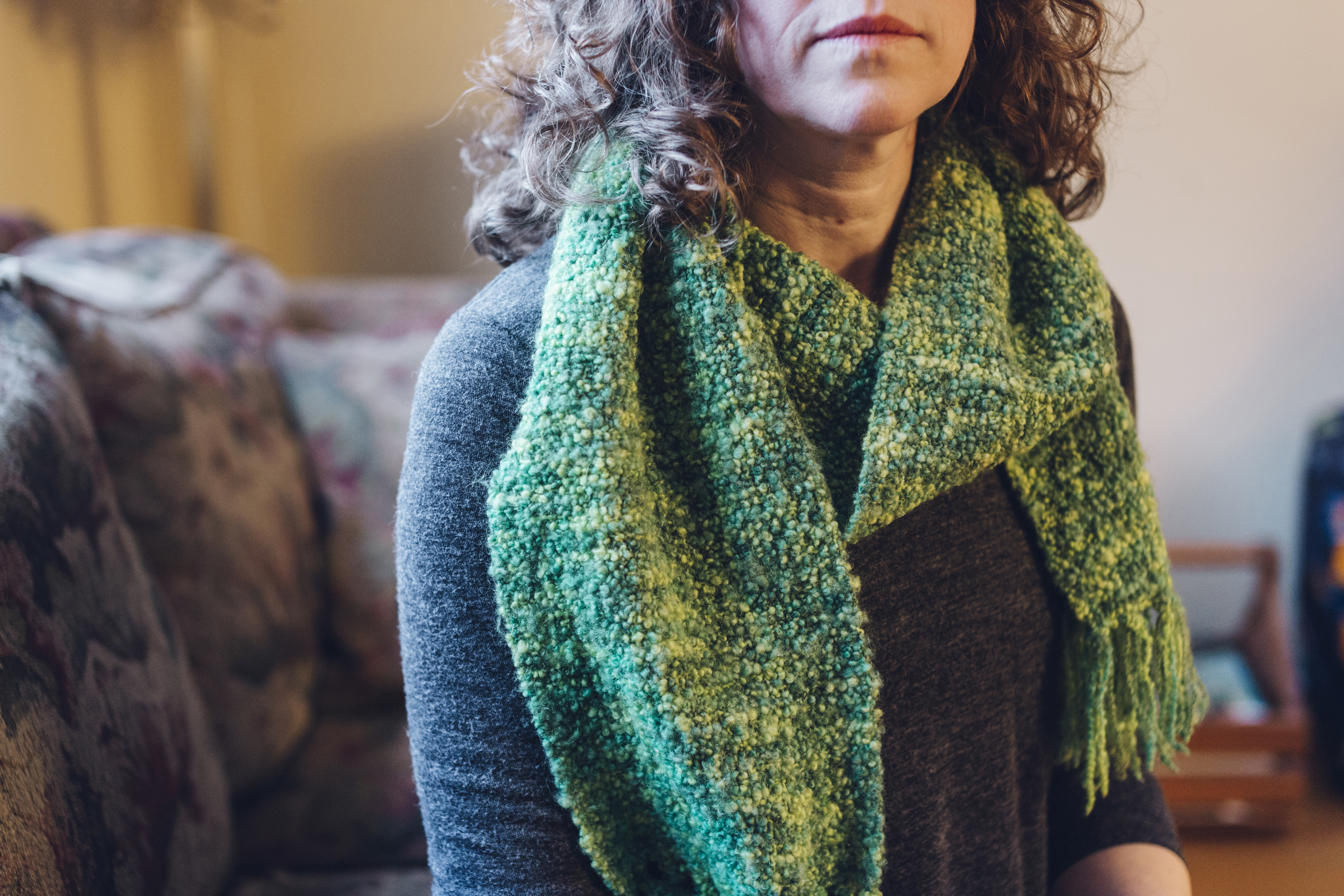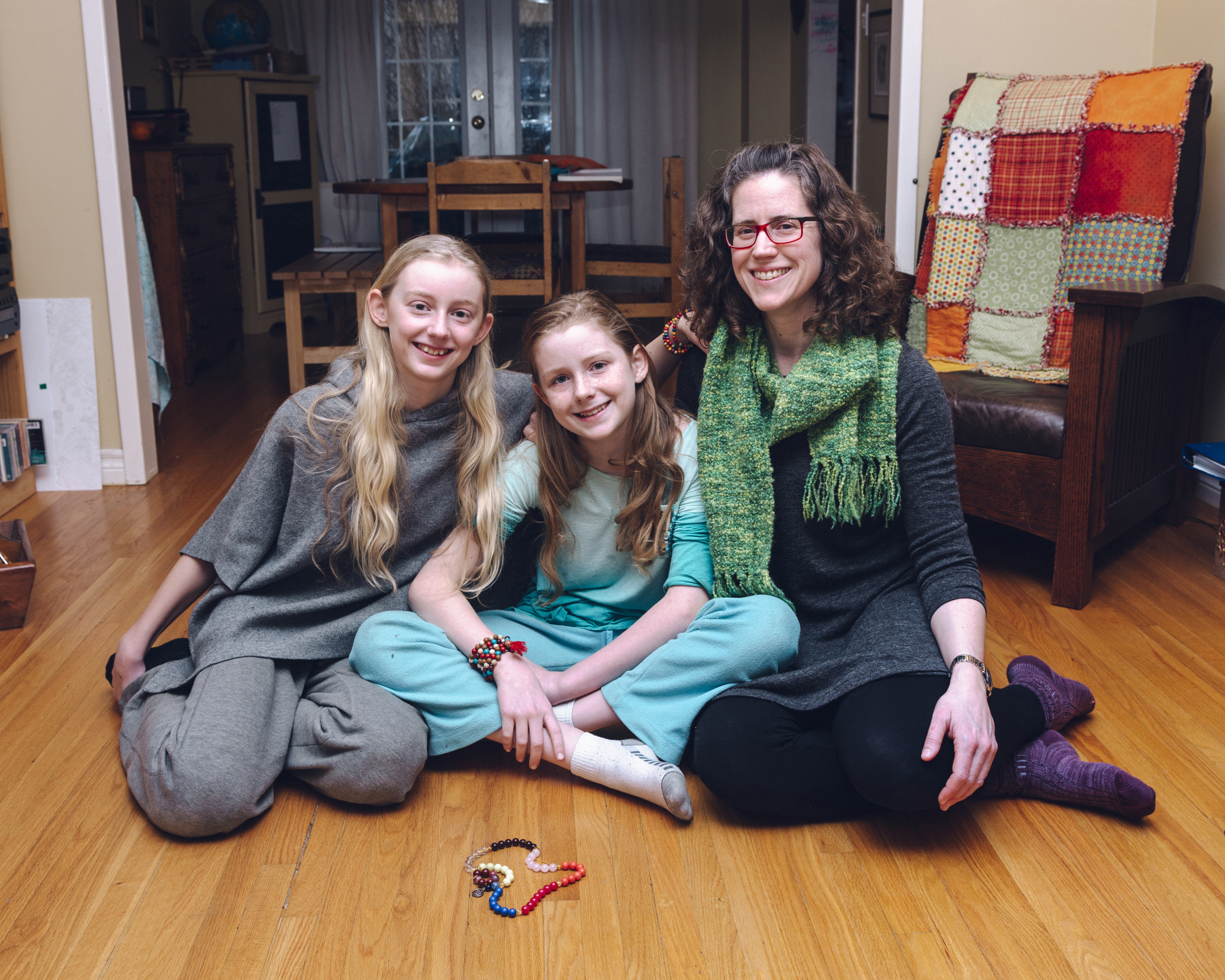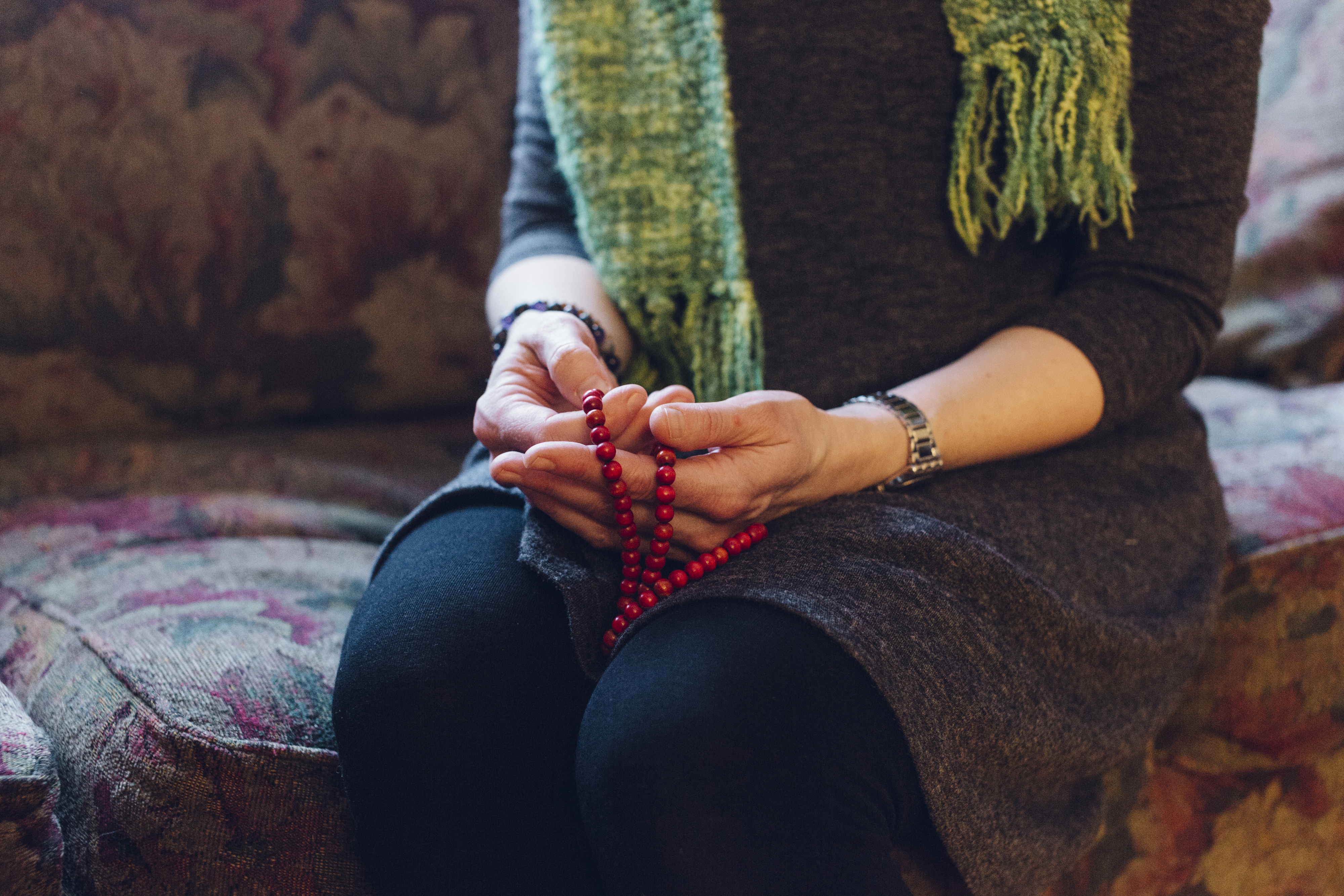Not long after the birth of my third child, I became sick.
As it turned out, I had been walloped by a combination of postpartum anxiety, depression and exhaustion. But at the time, all I knew was that something was very wrong. Sleep eluded me. When I did manage to drift off, I was plagued by nightmares. My energy drained away and I developed tremors in both hands. Worst of all was my heightened sensitivity. My usual protective padding or emotional filter had been torn away, leaving me overwhelmed by the roar of human suffering and pain, and, as a result, nearly incapacitated with sadness and anxiety.
Well-meaning advice – especially of the pious sort – only made things worse. Focus on the positive. Count your blessings. Be thankful you have three healthy children. I knew this intellectually, but knowing it was not enough to penetrate the miasma of fear and dread that enveloped me most of the time. I simply could not make myself feel thankful. Such comments only added a heavy layer of guilt to the burden I was already carrying.
While my doctor experimented with different medications, I tried other means of clambering out of the pit. A friend brought me audiobooks and I listened to them at night in an effort to keep my thoughts from spiralling down fearful paths. I said yes to those who offered to spend an hour or two with my young children so I could lie down for a while. As I got a bit more sleep my mind and body slowly began to settle and heal.
In the fall, my mom came to stay for a week. One day we went to Niagara-on-the-Lake, Ontario, my first outing since giving birth to my daughter in April. We were strolling very slowly down the main street, pausing every now and then to peer in shop windows, when I saw the scarf. Woven from soft Irish wool, in beautiful shades of variegated green, it made me think of fresh leaves in spring. I felt a flash of true pleasure – even joy – in these colours that whispered of new life. Tears welled up, but this time they were tears of thanks because I knew I was still capable of experiencing delight. For the first time in months I genuinely felt grateful.
My mom bought me the scarf. Every time I wore it I was reminded of that sudden burst of pleasure it had brought me at first sight, and how that pleasure touched a vein of true gratitude I had been unable to reach any other way.
What my scarf taught me was the secret of being specific. True gratitude is not a discipline you can impose on yourself. It is a joyful and heartfelt response to grace – and it is often through the most minute openings that grace reaches us.
I have had to learn this lesson over and over again.

A few years ago a friend gave me a mala, a string of 108 beads used in prayer and meditation. She explained that at the end of every day, I should sit down, take the first bead between my thumb and forefinger, and name something in my life for which I felt thankful. At first, this seemed awkward and burdensome, like writing the thank you notes my mom used to insist I compose every time I received a gift or was invited somewhere. For a couple of nights I handled my mala beads the way I had those thank you notes: I zipped through the first few with zeal and good intentions, but then ran out of ideas and grew bored and slightly resentful.
Determined to make my way through all 108 beads, I started naming small things: the first ripe peach of the season; the smell of the coffee beans when I opened the fresh bag; the gentle way the woman on the bus spoke to her little son; the feel of the hot shower on my skin in the morning; the evening breeze through my window; the tantalizing first chapter of my new library book; a particular chord in a song; some lyrics that touched me deeply. To my surprise, one small thing quickly led to another and in no time I had travelled all the way around the mala. After a few evenings of this I realized that I actually felt happier and more content.
Once again the secret lay in being specific.
Specific things are the sparks that ignite the flame of heartfelt gratitude. We just have to practise looking for them. Thankfulness is an attitude that can be cultivated, a way of seeing the world and our own circumstances in a way that is attuned to those tiny glimmers of grace.

So when I sit down for a meal with my own family, or gather with the children of the church where I work as an educator, we take time to think about and name aloud one small thing that brings us joy. Be specific, I urge. So they are: I’m thankful that my grandpa said his first word after his surgery; I’m thankful for my dog; I’m thankful that I got to pick the paint for my new room; I’m thankful for that big puddle in the schoolyard; I’m thankful that my friends from my old school are keeping in touch with me. Together we are learning the truth of this simple statement from The Secret of Saying Thanks by Douglas Wood: “We don’t give thanks because we’re happy. We are happy because we give thanks.”
Not long ago I gave each of my children a mala. While I would not call it a key to happiness, it is one tool that I hope will help them practise looking for those small and specific things – one step to becoming genuinely thankful people.
And yes, I make them write thank you notes.




25 Responses to “ How to Be Grateful ”
Wonderful article, Laura!
Thank you for the courage it takes to write and publish from the heart. This piece has touched me deeply after my own sleepless night. If it has connected with one human being, it has certainly connected with others, and I am grateful for sharing in your personal journey toward healing and grace by being on the receiving end and given this opportunity to leave a reply. Thank you for sharing your moments of grace.
Thanks, Laura. I’ve been fortunate to have received thank you notes and I’ve saved all of them. From time to time I reread them as they speak to me about my authentic self. They boost my spirit.
I also send thank you notes to anyone who has been helpful to me or to someone I know. It’s amazing how much they are appreciated.
A beautiful article that not only reminds us that our mental well-being is so important but that the little things, such as the simple act of intentional gratitude, go a long way. Thank you! I will be passing this article on to family and friends.
Laura, I deeply appreciate your article. In my practice as a psychologist, and as a friend to people experiencing depression, I know that a gratitude practice is healing. Always, I struggle to describe an exercise that won’t feet artificial or insincere. Your guidelines are so helpful. Thank you!
Nicely written. Gratitude remains a spiritual exercise and a lovely personal habit. Thanks for sharing.
Now I finally understand the meaning of the song “My Favorite Things” from The Sound of Music. For years that song has puzzled me. Thank you for sharing your journey and excellent advice.
I can only think that you didn't experience sadness or anxiety in any way that I can understand. In my many years as a person and as a psychologist, I have never known those feelings to be so sweetly and inspirationally vanquished. Good for you, but millions of people are not able to follow your example.
Thank you for sharing your story. I completely understand the scenario when your rational mind tells you one thing but your emotional mind doesn't listen. I've felt those dark moments and my rational mind knows they will pass, but my emotional mind struggles and I cry a lot. Your story of the scarf made me think of Marie Kondo and her book about tidying up. She advises that when deciding whether to keep things or not, hold it and decide whether it brings you joy -- like your scarf, which I love! I'm going to try the mala beads and share this with my teenage daughters, too. I think it could help us all.
Thank you for sharing your specific experience. Writing is such a wonderful outlet, especially when it's just for the sheer pleasure of writing and helping others in their journey.
What a splendid example of discovering creative ways to find happiness for oneself and for others -- by conveying genuine messages of thanks. It takes only a second to say thank you.
Such a hopeful piece! Grateful to have read it tonight. Grateful that I can feel grateful again. Thank you for sharing and in such beautifully touching way, too.
Beautiful article, Laura. It reminds me of the Indigenous practice of expressing gratitude in the morning, evening and before each gathering. I was amazed several years ago when a family began a press conference by thanking the police, doctors, media and attendees for their support after their daughter had been brutally attacked and left for dead. Imagine rising above your own grief and anger in such a situation to express gratitude!
Laura, thank you. Thanks for sharing with us.
Loved your article, Laura. I am happy that you found a trick that helped you get back on track. We are overconsumed with tasks, papers, thoughts. Consciously thinking about specific things that we are grateful about can help us shut the mind monkey, relax and focus on happy thoughts! I am buying my own mala today :)
Hi Laura, thank you for this article and shining a guiding light to finding fulfilment. It is easy to let the clouds darken our thoughts, much harder to appreciate the little things.
What a beautiful article. Thank you, Laura, for your vulnerability and sharing what you've learned. Profound.
I've been listening a lot to the American Buddhist nun, Pema Chodron, and your words make me think of some of the things she says that have really resonated with me...on the path to becoming more and more open-minded and open-hearted beings in the world. Thank you for how you are journeying in this way - clearly a great blessing to the world, your own family and community, and your own being.
Thank you so much, Laura Alary, for the simple and profound message about working through the "miasma" (Laura's wonderful word) of depression. We all need the reminder to be specifically grateful.
Thank you for what you shared, Laura, and I love your quote from Douglas Wood! The spiritual discipline of thankfulness has a profound effect on us.
I find great value in the sharp distinction between being thankful “in” everything and being thankful “for” everything. No sane person is going to be thankful for disaster. We do not welcome grief. At the same time, in our deep sadness, there are those who care for us, and there are “goodnesses” or blessings we still have.
Giving thanks for each specific provision does help us through the darkness of sad times. So, as St. Paul tells us in his first letter to the Thessalonian church (the fifth chapter, eighteenth verse), we are to give thanks in all circumstances, not for what has gone wrong, but for the grace we find even in our most difficult situations. It is good to give thanks!
Thank you, Laura, for your shared wisdom.
Thanks for sharing. In the Islamic tradition, believers are "grounded" and anchored in meditational peace through the five daily liturgical prayers. In each "cycle" or "circuit" of each one of these five prayers, one begins with the recitation of Surah al-Fatihah, the Opening Chapter of the Holy Qur'an. The very first words of this prayer are: "All thanks/praise/gratitude is due to Allah (God), the Lord and Sustainer of the Worlds." There is no doubt that people who are grateful are happier people. The quote from Douglas Wood is correct: "We don't give thanks because we are happy. We are happy because we give thanks."
Being specific and thankful for small things works. Thank you, Laura.
LOVED this. I don't have a mala but I developed a "blessings journal" seven years ago (to add to my daily journaling practice). Like the author, I try to include the simplest of things as well as those that come to mind more easily. I think it has made me take greater notice of these things and, through the memory of them, the joy that has been a part of each day. It grounds me in the present and give me hope for the future. Thanks for sharing this gift of grace.
This is beautifully written. Many of us experience depression postpartum, as well as feeling overwhelmed. I was lucky I was treated early for my depression and here I am at 73, with a master's degree in engineering under my belt. I have learned many things about myself and that there is lots of good help out there. Being busy with useful and intellectual things and exercising helped me, as did having good friends, travelling and sitting quiet at times to feel the beauty of nature, summer or winter. Reaching out to get help and speaking up when you have to is very important, no matter what people think or say about you. Self-confidence is very important.
Good luck to all those who are having a rough time. You will come out at the other end feeling good about yourself and realizing your potential.
Thanks, Laura. I just discovered your site. Your ways of coming through your depression are helpful for me. During these more troubling times, I'm thinking of you and so many others. Be well. I am so grateful for your creative, reflective words in your books, theology and educational workshops.